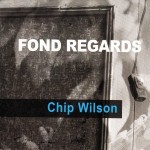Chip Wilson is a folk musician by default, the way you might call Leonard Cohen a folk musician. Accompanying himself on six-string guitar, he fingerpicks in a discursive style that accompanies his soft, fragile but intensely expressive voice as he plies spooky tales of New Orleans that disappear like wisps of purple clouds in the crepuscule.
On a couple of these tales his simple strokes are embellished by spare accompaniment such as Helen Gillet’s moody cello on the eerie song of emotional collapse, “Her Mother’s Daughter,” or James Westwall’s vibes on “I Descend FromCain,” but the variations produce more introspection than joy. Wilson can be prosaically bleak as well, like on “New Cheap Shoes,” and he probably should be called a blues player, too, especially since so many of his songs deal with the exploration of some human state somewhere south of despair, where giving up your freedom is the inevitable result of suffering cruelties so baroque they transcend description.
The only oasis of freedom on the album is depicted in the static and dysfunctional family portrait “Ninth Ward Chickens.” Despair and revulsion belie the beautiful picking that drives the dyspeptic note “Conversation in a Car (Even With You),” and one can only imagine the misdeeds that led to his decision in “Whistling Past Whatever Graveyard” to cross over “to the hot side of the street to make sure we don’t meet.” The sense of shock and partially destroyed life in the wake of some unnamable horror haunts his songs like a death sentence. Even what passes for humor in “Sho’ Likes Her Liquor” depicts life’s miseries in a sleek deadpan.
Wilson’s songs are so bleak they add a surreal context to such classic nightmare scenarios as “St. James Infirmary Blues” and “Lakes of Pontchartrain.” Nevertheless, his beautiful playing offers a weird kind of saving grace throughout. This is what brings this all so close to the blues, and his ability to write such a revealing line as “I’m an incomplete person, still learning how to be a man” shows that a beam of self-awareness still peeks through the gloaming. The artful picking in the sad and wonderful instrumental “Bartholomew Street Strut” glistens like pools of rainwater in the street after an August thunderstorm. I find this record strangely addictive, tugging at my emotional capacity for entropy. And God, don’t I know those chickens he’s talking about.




